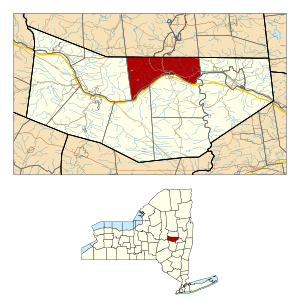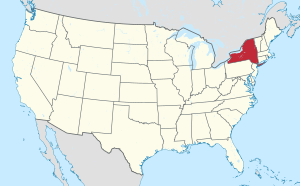Mohawk, Montgomery County, New York facts for kids
Quick facts for kids
Mohawk, New York
|
|
|---|---|

Location in Montgomery County and the state of New York.
|
|

Location of New York in the United States
|
|
| Country | United States |
| State | New York |
| County | Montgomery |
| Area | |
| • Total | 35.39 sq mi (91.67 km2) |
| • Land | 34.68 sq mi (89.82 km2) |
| • Water | 0.71 sq mi (1.85 km2) |
| Population
(2010)
|
|
| • Total | 3,844 |
| • Estimate
(2017)
|
4,925 |
| • Density | 108.68/sq mi (41.96/km2) |
| Time zone | UTC−05 (EST) |
| • Summer (DST) | UTC−04 (EDT) |
| FIPS code | 36-057-47834 |
Mohawk is a town located in Montgomery County, New York, in the United States. In 2010, about 3,844 people lived there. The town is on the northern edge of Montgomery County. It is west of the City of Amsterdam. The main town for the county, Fonda, is actually located within the Town of Mohawk.
Contents
History of Mohawk Town
Early Settlements and Native Americans
Around 1642, Jesuit missionaries came to this area from Quebec. They came to work with the Mohawk Native Americans. The main village of the Mohawk people was called Caughnawaga. This village later became the site of the modern-day town of Fonda.
European colonists started settling the area around 1725. These settlers came from the English and Dutch regions to the east, near Albany.
Forming the Mohawk District
In March 1772, the Mohawk District was created by Sir William Johnson. This happened when Tryon County was separated from Albany County. The Mohawk District was the easternmost of five districts in the new county. Its eastern border went north from the Delaware River through what is now Schoharie County. It then followed a line that now forms the eastern borders of Montgomery, Fulton, and Hamilton Counties, all the way to Canada. The western edge of the district was a line drawn through "the noses." These are prominent rock formations where the Mohawk River flows, about four miles east of Canajoharie.
Mohawk During the American Revolution
During the American Revolution, the town faced an invasion in 1780. An army of British-allied Iroquois and British Loyalists attacked the area.
The original Mohawk District was later divided in 1793. It was split into the Towns of Florida and Charleston. The current Town of Mohawk was formed much later, in 1837. It was created from a part of the Town of Johnstown. At that time, its population was 3,112 people. By 1865, the population had slightly decreased to 2,948.
Preserving Native American Culture
In 1993, a historic colonial estate called Montgomery Manor was bought. This estate once belonged to Major Jelles Fonda. It was purchased by a non-profit group called Kanatsiohareke. This name means "Gah nah joe hah lay geh." This community is a Haudenosaunee (Iroquois) community. It is led by an elder and spiritual leader named Tom Sakokwenionkwas Porter. The community works to promote the traditions, beliefs, and government of the Haudenosaunee people. They also help to preserve the Haudenosaunee culture.
Geography of Mohawk
Location and Borders
The Town of Mohawk covers a total area of about 35.4 square miles (91.7 square kilometers). Most of this area, about 34.7 square miles (89.9 square kilometers), is land. The rest, about 0.7 square miles (1.8 square kilometers), is water.
The northern border of the town is shared with Fulton County. The southern border of the town is formed by the Mohawk River.
Major Roads
Several important roads run through the Town of Mohawk:
- New York State Route 5 runs alongside the Mohawk River.
- New York State Route 30A and New York State Route 334 meet NY-5 in Fonda.
Population and People
| Historical population | |||
|---|---|---|---|
| Census | Pop. | %± | |
| 1840 | 2,112 | — | |
| 1850 | 3,095 | 46.5% | |
| 1860 | 3,136 | 1.3% | |
| 1870 | 3,015 | −3.9% | |
| 1880 | 2,943 | −2.4% | |
| 1890 | 2,839 | −3.5% | |
| 1900 | 2,711 | −4.5% | |
| 1910 | 2,488 | −8.2% | |
| 1920 | 2,353 | −5.4% | |
| 1930 | 2,730 | 16.0% | |
| 1940 | 2,753 | 0.8% | |
| 1950 | 2,680 | −2.7% | |
| 1960 | 3,070 | 14.6% | |
| 1970 | 3,677 | 19.8% | |
| 1980 | 3,795 | 3.2% | |
| 1990 | 3,976 | 4.8% | |
| 2000 | 3,909 | −1.7% | |
| 2010 | 3,844 | −1.7% | |
| 2017 (est.) | 4,925 | 28.1% | |
| U.S. Decennial Census | |||
In 2010, the town had 3,844 people living in 1,528 households. About 1,043 of these were families. The population density was about 112 people per square mile. There were 1,607 housing units in the town.
Most of the people in Mohawk are White (97.7%). Other groups include African-American (0.4%), Native American (0.2%), and Asian (0.5%). About 2.2% of the population was Hispanic or Latino.
Households and Families
About 26.6% of households had children under 18 living with them. Most households (68.3%) were married couples living together. About 10.8% of households had a female head with no husband present. Around 30.2% of all households were made up of people living alone.
The average household had about 2.49 people. The average family had about 2.98 people.
Age Distribution
The population in Mohawk is spread across different age groups:
- 25.4% were under 18 years old.
- 6.8% were between 18 and 24 years old.
- 28.2% were between 25 and 44 years old.
- 24.8% were between 45 and 64 years old.
- 14.2% were 65 years or older.
The average age of people in the town was 38 years. For every 100 females, there were about 94 males.
Income Levels
The median income for a household in Mohawk was $25,714. For families, the median income was $62,174. The average income per person in the town was $27,725. About 7.4% of the total population lived below the poverty line. This included 3.4% of those under 18 and 6.2% of those 65 or older.
Communities in the Town of Mohawk
The Town of Mohawk includes several smaller communities:
- Berryville – A small village located northwest of Fonda.
- Big Nose – A place in the southwestern part of Mohawk. Together with "Little Nose" on the other side of the Mohawk River, it marks a spot known as "The Noses."
- East Stone Arabia – A small village in the western part of the town.
- Fonda – This is the main village and the county seat (the administrative center) of Montgomery County. It is on the north bank of the Mohawk River, along NY Route 5. It is also near the historic Caughnawaga Indian Village Site.
- Tribes Hill – A small village in the eastern part of the town, also on NY-5.
- Yosts – A small village located on NY-5 and the north bank of the Mohawk River, west of Fonda.
See also
 In Spanish: Mohawk (condado de Montgomery, Nueva York) para niños
In Spanish: Mohawk (condado de Montgomery, Nueva York) para niños
 | Selma Burke |
 | Pauline Powell Burns |
 | Frederick J. Brown |
 | Robert Blackburn |

